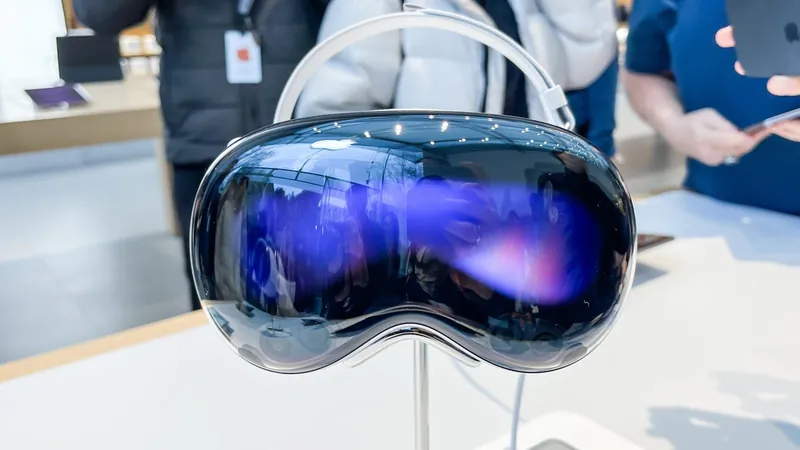
Apple's Bold Plans for AR/VR: Smart Glasses Set to Transform Technology by 2027!
2025-07-11
Author: Mei
A Game-Changer on the Horizon
Apple is gearing up for a major leap into the augmented and virtual reality market by 2027, according to industry analyst Ming-Chi Kuo from TF International Securities. This comes amid excitement surrounding the impending release of the upgraded Vision Pro headset later this year.
What to Expect: Vision Products Galore
The tech giant is said to be working on three new products under its Vision series, complemented by four innovative pairs of smart glasses. Notably, a Ray-Ban style offering is anticipated to sell between 3 to 5 million units in 2027, further solidifying Apple's bid in this booming market.
Apple has its sights set high, aiming to ship over 10 million AR and VR devices in 2027, positioning this sector as the next frontier of consumer technology.
Innovative Upgrades Coming Soon
This year, Apple is poised to unveil the Vision Pro M5 Version, showcasing an impressive upgrade from the M2 chip that is expected to enhance performance significantly.
Future Vision: Lighter and Smarter
Fast forward to 2027, and prepare for the Vision Air – a lighter version of the headset boasting a 40% reduction in weight, powered by the latest iPhone processor. Following that, a second-generation Vision Pro set for 2028 promises a dramatically lighter design at a more consumer-friendly price.
As for the smart glasses, Apple plans to launch a displayless, mass-market pair of frames in 2027 and aims to introduce extended reality (XR) glasses featuring a see-through color display in 2028, complete with AI integration.
Smart Glasses Market: Explosive Growth Ahead
The smart glasses market is on a rapid ascent, valued at approximately $1.93 billion in 2024 and projected to soar to $8.26 billion by 2030, according to Grand View Research. This growth has prompted numerous tech giants to dive into the next wave of wearable technology.
Competitors like Meta are actively developing their own smart glasses, including collaboration products featuring transparent displays, as the race for dominance in the AR/VR landscape heats up. Meanwhile, Google has launched its Android XR platform this year, alongside new glasses created in partnership with Qualcomm and Samsung.
Meta's Challenge in the Market
In this competitive environment, Meta stands to gain the most since it lacks a proprietary phone or computing platform, often subject to the policies of Apple, Microsoft, and Google. Establishing a stronghold in the AR and VR arena could strategically enable Meta to control both hardware and software in the burgeoning smart glasses market.


 Brasil (PT)
Brasil (PT)
 Canada (EN)
Canada (EN)
 Chile (ES)
Chile (ES)
 Česko (CS)
Česko (CS)
 대한민국 (KO)
대한민국 (KO)
 España (ES)
España (ES)
 France (FR)
France (FR)
 Hong Kong (EN)
Hong Kong (EN)
 Italia (IT)
Italia (IT)
 日本 (JA)
日本 (JA)
 Magyarország (HU)
Magyarország (HU)
 Norge (NO)
Norge (NO)
 Polska (PL)
Polska (PL)
 Schweiz (DE)
Schweiz (DE)
 Singapore (EN)
Singapore (EN)
 Sverige (SV)
Sverige (SV)
 Suomi (FI)
Suomi (FI)
 Türkiye (TR)
Türkiye (TR)
 الإمارات العربية المتحدة (AR)
الإمارات العربية المتحدة (AR)